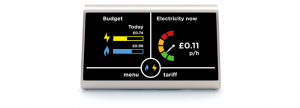
What is a smart meter?
On its most basic level, a smart meter is an automated energy meter. It records your energy use every half hour and sends the data to your supplier over a secure network, ensuring that you get accurate bills. They are provided with a monitor, which you can use in your home to see how much energy you are using and when. Within the current energy system, this may help you reduce your usage through identifying which of your appliances use the most electricity. However, the real potential in smart meters goes far further than this.
Oh yes?
Yes. Being able to tell how much energy a household uses hour by hour means that an energy supplier can create live changing tariffs. The first tariff of this kind was launched in 2016 from Green Energy and is called TIDE. The potential to save money is an incentive to put your washing on a timer in the morning, but you need a smart meter for it to work.
Eventually, smart appliances will be the norm. These are appliances that are connected to the internet so that they come on when energy is cheapest, or when you remotely tell it to. This would not only result in cost savings to well organised households, it could also reduce carbon emissions. That’s because reserve power for peak times comes from fossil fuels.
You may have heard of the need for an ‘energy mix’ because renewable energy sources are too unpredictable and so unreliable. Smart meters enable a smart grid that is more flexible and able to cope with variable supply through behaviour change and, eventually, some degree of automation.
What’s all the controversy?
Well, there are a few issues. Some technological, some political and some downright philosophical.
- The technology
The first generation of smart meters have a fault where they stop working when you switch energy supplier. This isn’t very compatible with the advice that you switch once every year or two. The problem has been fixed for the second generation of smart meters, but these will be installed under after the remaining stock of the first generation meters. You may choose to wait because of this, but as the meters only lose the smart functionality and still work as conventional meters, you wouldn’t be losing out if you don’t.
There have also been reports of people receiving outrageous bills of thousands of pounds for a day’s energy. Metering problems happen with traditional meters too, and none these cases have had to pay a penny. So, although there may be teething troubles with the tech, none of this is a reason not to get a smart meter if you want one.
- The political
There have been criticisms about the speed and consistency of the roll out. Smart GB, the organisation set up by government to lead on the process, was criticised by researchers at Sussex University for a lack of engagement, particularly with older or more vulnerable consumers. They claimed that low initial uptake means that about 40,000 smart meters will need be installed per day to meet the target of every UK household having one by 2020. This target has been watered down to every household being offered a smart meter by 2020. This controversy doesn’t reflect badly on the technology itself but more on the government’s implementation of a policy that is central to their carbon reduction strategy.
- The philosophical
Well maybe philosophical is a bit much. The last concern relates to privacy. The automated live updates mean that your energy supplier will know more about your life than they do now. Someone looking at your data may be able to make an informed guess on what hours you are home and what appliances you use. If it’s any consolation, your supplier won’t be able to share your data without your permission, unless as part of a criminal investigation. The government and Ofgem have designed the network to be as protected as possible against cyber attack, but of course, there is no guarantee.
Should I get one?
It really depends on your priorities. They are a positive step in prevented catastrophic climate change and will enable you to save money, but to do this they produce more data about you and your life which could potentially be stolen.
If you would like a smart meter installed, contact your energy supplier.
